语法知识—情态动词的知识点总复习附答案
高考英语情态动词语法知识点与用法
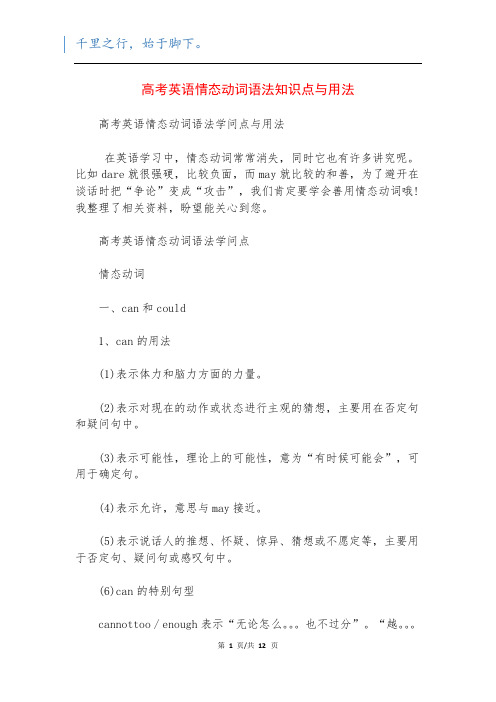
高考英语情态动词语法知识点与用法高考英语情态动词语法学问点与用法在英语学习中,情态动词常常消失,同时它也有许多讲究呢。
比如dare就很强硬,比较负面,而may就比较的和善,为了避开在谈话时把“争论”变成“攻击”,我们肯定要学会善用情态动词哦!我整理了相关资料,盼望能关心到您。
高考英语情态动词语法学问点情态动词一、can和could1、can的用法(1)表示体力和脑力方面的力量。
(2)表示对现在的动作或状态进行主观的猜想,主要用在否定句和疑问句中。
(3)表示可能性,理论上的可能性,意为“有时候可能会”,可用于确定句。
(4)表示允许,意思与may接近。
(5)表示说话人的推想、怀疑、惊异、猜想或不愿定等,主要用于否定句、疑问句或感叹句中。
(6)can的特别句型cannottoo / enough表示“无论怎么。
也不过分”。
“越。
越好”。
cannot but+ do sth.表示“不得不,只好”。
2、could的用法(1)表示力量,指的是过去时间。
(2)表示允许,指的是过去时间。
(3)表示可能,可以指过去时间,也可以指现在时间,表示语气缓和。
(4)委婉客气地提出问题或陈述看法,指的是现在时间。
主要用于疑问句,回答时用can。
3、can与could的区分can表推想时只用于否定句和疑问句(could无此限制)。
couldnt 的可能性比cant小。
4、can与be able to的区分(1)现在时:无区分,但后者不常用。
(2)完成时;can没有完成时,此时要用have(has,had)been able to。
(3)将来时:can没有将来时,要用will be able to。
(4)过去时:could表示一般力量,was/were able to 表示在详细场合通过努力胜利做成某事的力量。
二、may 和might1、may的用法(1)表示询问或说明一件事可不行以做。
(2)表示一件事或许会发生或某种状况可能会存在,通常用在确定句和否定句中。
最新初中英语语法知识—情态动词的知识点总复习有答案解析(3)
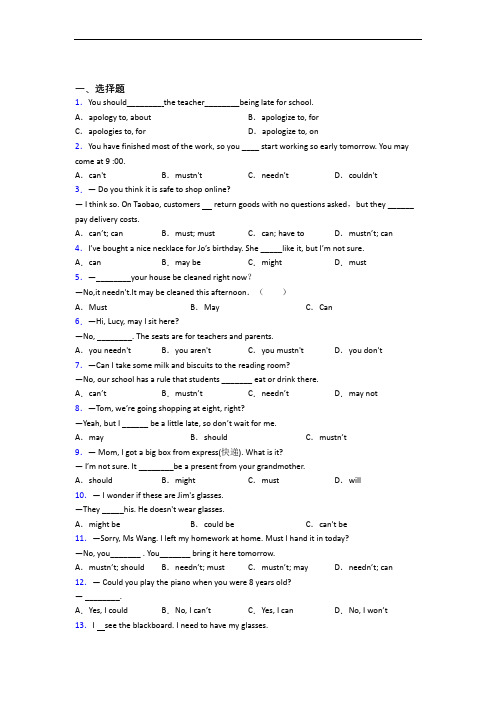
一、选择题1.You should________ the teacher________being late for school.A.apology to, about B.apologize to, forC.apologies to, for D.apologize to, on2.You have finished most of the work, so you ____ start working so early tomorrow. You may come at 9 :00.A.can't B.mustn't C.needn't D.couldn't3.— Do you think it is safe to shop online?— I think so. On Taobao, customers return goods with no questions asked,but they ______ pay delivery costs.A.can’t; can B.must; must C.can; have to D.mustn’t; can 4.I’ve bought a nice necklace for Jo’s birthday. She _____like it, but I’m not sure.A.can B.may be C.might D.must5.—________your house be cleaned right now?—No,it needn't.It may be cleaned this afternoon.()A.Must B.May C.Can6.—Hi, Lucy, may I sit here?—No, ________. The seats are for teachers and parents.A.you needn't B.you aren't C.you mustn't D.you don't 7.—Can I take some milk and biscuits to the reading room?—No, our school has a rule that students _______ eat or drink there.A.can’t B.mustn’t C.needn’t D.may not 8.—Tom, we’re going shopping at eight, right?—Yeah, but I ______ be a little late, so don’t wait for me.A.may B.should C.mustn’t9.— Mom, I got a big box from express(快递). What is it?—I’m not sure. It ________be a present from your gr andmother.A.should B.might C.must D.will10.— I wonder if these are Jim's glasses.—They _____his. He doesn't wear glasses.A.might be B.could be C.can't be11.—Sorry, Ms Wang. I left my homework at home. Must I hand it in today?—No, you_______ . You_______ bring it here tomorrow.A.mustn’t; should B.needn’t; must C.mustn’t; may D.needn’t; can 12.— Could you play the piano when you were 8 years old?— ________.A.Yes, I could B.No, I can’t C.Yes, I can D.No, I won’t13.I see the blackboard. I need to have my glasses.A.can B.can’t C.must D.mustn’t 14.—Can you come to my party on Saturday afternoon?—Sorry, I can’t. I ________ meet my friends.A.can’t B.might have to C.needn’t15.-Could you help me with my English homework, Nancy?-Of course I____________. Glad to help.A.could B.can C.must D.do16.—Jack must be in his office, I think.—No, he be in the office. He flew to Canada this morning.A.needn't B.shouldn't C.can't D.mustn't 17.—Must I go out to have dinner with you, Mum?—No, you , my dear. You’re free to make your own decision.A.shouldn’t B.mustn’t C.needn’t D.can’t 18.(2017·甘肃白银·10)—I wonder if these are Danny's glasses.—They________be Danny's. He doesn't wear glasses.A.can't B.must C.mustn't D.can19.This book _____ Lucy’s. L ook! Her name is on the book cover.A.must be B.may be C.can’t be D.mustn’t be 20.一Hurry up, Mark! Let's cross the road as quickly as possible.一No,you . Don't you see the light is still red?A.couldn't B.wouldn't C.mustn't D.needn't 21.(2017 • 湖北省宜昌市中考)—Life is becoming convenient with the Internet.—That’s true! Almost everything be done online.A.must B.would C.should D.can 22.—Doesn’t Frank like staying at home and looking after his little sister?—_______, but he ________ because both of his parents work.A.Yes; has to B.No; has toC.Yes; doesn’t have to D.No; doesn’t have to【参考答案】***试卷处理标记,请不要删除一、选择题1.B解析:B【解析】【详解】句意:你应该因为上学迟到向老师道歉。
2023年中考英语一轮复习语法知识专项突破-情态动词(含答案解析)
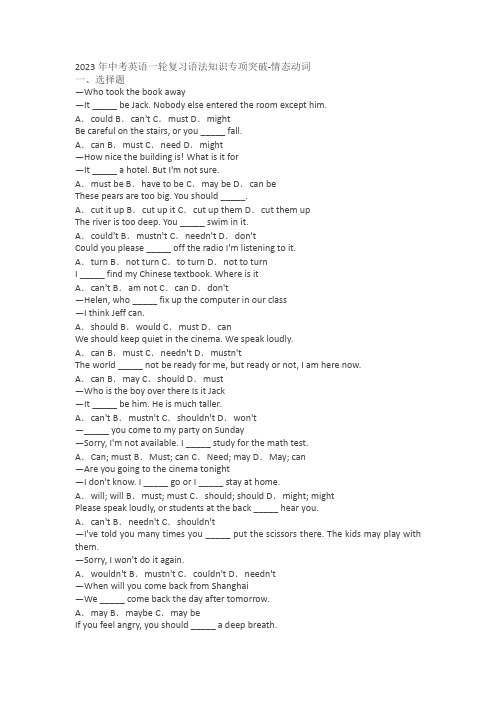
2023年中考英语一轮复习语法知识专项突破-情态动词一、选择题—Who took the book away—It _____ be Jack. Nobody else entered the room except him.A.could B.can't C.must D.mightBe careful on the stairs, or you _____ fall.A.can B.must C.need D.might—How nice the building is! What is it for—It _____ a hotel. But I'm not sure.A.must be B.have to be C.may be D.can beThese pears are too big. You should _____.A.cut it up B.cut up it C.cut up them D.cut them upThe river is too deep. You _____ swim in it.A.could't B.mustn't C.needn't D.don'tCould you please _____ off the radio I'm listening to it.A.turn B.not turn C.to turn D.not to turnI _____ find my Chinese textbook. Where is itA.can't B.am not C.can D.don't—Helen, who _____ fix up the computer in our class—I think Jeff can.A.should B.would C.must D.canWe should keep quiet in the cinema. We speak loudly.A.can B.must C.needn't D.mustn'tThe world _____ not be ready for me, but ready or not, I am here now.A.can B.may C.should D.must—Who is the boy over there Is it Jack—It _____ be him. He is much taller.A.can't B.mustn't C.shouldn't D.won't—_____ you come to my party on Sunday—Sorry, I'm not available. I _____ study for the math test.A.Can; must B.Must; can C.Need; may D.May; can—Are you going to the cinema tonight—I don't know. I _____ go or I _____ stay at home.A.will; will B.must; must C.should; should D.might; mightPlease speak loudly, or students at the back _____ hear you.A.can't B.needn't C.shouldn't—I've told you many times you _____ put the scissors there. The kids may play with them.—Sorry, I won't do it again.A.wouldn't B.mustn't C.couldn't D.needn't—When will you come back from Shanghai—We _____ come back the day after tomorrow.A.may B.maybe C.may beIf you feel angry, you should _____ a deep breath.A.take B.taking C.to take— Listen! I think it _____ be Susan singing in the office.—No. It _____ be her. She left for London two days ago.A.must; can't B.may; mustn't C.must; mustn'tLook at the "No Parking"sign. You _____ park your car here.A.should B.needn't C.mustn'tHis sister _____ speak any English two years ago, but now she _____ talk to Americans in English.A.couldn't; could B.couldn't; can C.can't; could D.can't; canFive hours' walk, and you _____ be tired. Now sit down and have a rest.A.can B.should C.must D.willI _____ ride a bike when I was six years old.A.could B.would C.should D.canWe _____ respect the disabled and be kind to them.A.dare to B.ought to C.have to—Must we clean the classroom now—No, you _____. You can do it after school.A.mustn't B.shouldn't C.needn't—Do I have to finish my homework before supper—Yes, you _____, or you can't go to the theater with us.A.can B.must C.mayHe _____ like coffee. I see him drink a cup sometimes.A.can't B.must C.may D.mustn't—Look! Fireworks!—Wow! How beautiful! But people living in this area can't _____ fireworks.A.let off B.get off C.let out D.get out—What will the weather be like this afternoon, Anna—It _____ be fine. But who knows It's always changing quickly.A.must B.will C.may D.need—What's your plan for the winter holiday—I _____ go back to my hometown with my parents. They haven't decided yet. A.must B.may C.need D.shouldTeachers should _____ their students to practice _____ English as much as possible. A.let; speaking B.encourage; speakingC.make; speak D.let; speakJohn _____ come to see us tonight, but he isn't very sure yet.A.may B.can C.has to D.mustYou _____ be afraid of that dog. Look. It's a toy.A.needn't B.can't C.mustn't D.don't—Jeff, you _____ swim alone in the river. It's dangerous.—Sorry, I won't.A.can B.must C.should D.shouldn't—Must I get there on time—No, you _____.A.can't B.mustn't C.needn't D.couldn'tAll the drivers _____ reduce speed when driving near the zebra crossing.A.may B.can C.must D.need—Tom, please tell Jack the good news.—I _____. His father has told him about it already.A.don't have to B.have to C.must D.mustn'tThe man can't _____ stories, but he can _____.A.tells; sings B.say; dance C.tell; swimPeter can't go to the party because he _____ look after his sister at home.A.can B.has to C.would likeThe girl was _____ scared that she _____ say a word.A.so; can't B.too; couldn't C.so; couldn't—_____—I would like some ice cream, please.A.What kind do you want B.What size would you likeC.May I take your order D.Is there any ice cream—Where are you going to study—I'm not sure. I _____ study in Beijing.A.might B.should C.must D.canYou _____ drive so fast, for we have enough time to arrive at the station.A.can't B.mustn't C.needn't D.shouldn'tA country has dreams. We teenagers _____ also have dreams. With dreams and hard work, anything amazing can be created.A.may B.must C.should D.can—Can you come to my party on Thursday, Jenny—Sorry, I can't. I _____ finish my homework first.A.may B.will C.have to D.canIt is raining now, Jim can't _____ on the playground.A.do morning exercises B.does morning exercisesC.do morning exercise D.does morning exercise—Hurry up, Jeff! Let's cross the road as fast as possible.—No, you _____. Don't you see the light is still redA.couldn't B.wouldn't C.mustn't D.needn't—Molly, can you swim—Yes, I _____. I do it really well!A.can B.can't C.need D.must—Must I make a phone call to him now—No, you _____. You _____ write an email.A.mustn't; may B.may not; mustC.shouldn't; must D.don't have to; may—I can't stop smoking, doctor.—For your health, I'm afraid you _____.A.may B.can C.have to D.need—Must I practice soccer every day—No, you _____.A.must B.mustn't C.needn't D.can't答案一、选择题(共50题)1. 【答案】C【解析】——谁把书拿走了?——一定是杰克,除了他没人进房间。
高考英语情态动词语法知识点与用法
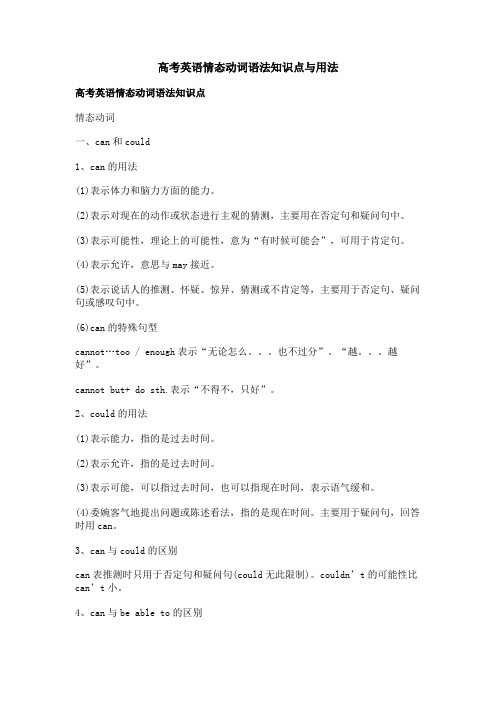
高考英语情态动词语法知识点与用法高考英语情态动词语法知识点情态动词一、can和could1、can的用法(1)表示体力和脑力方面的能力。
(2)表示对现在的动作或状态进行主观的猜测,主要用在否定句和疑问句中。
(3)表示可能性,理论上的可能性,意为“有时候可能会”,可用于肯定句。
(4)表示允许,意思与may接近。
(5)表示说话人的推测、怀疑、惊异、猜测或不肯定等,主要用于否定句、疑问句或感叹句中。
(6)can的特殊句型cannot…too / enough表示“无论怎么。
也不过分”。
“越。
越好”。
cannot but+ do sth.表示“不得不,只好”。
2、could的用法(1)表示能力,指的是过去时间。
(2)表示允许,指的是过去时间。
(3)表示可能,可以指过去时间,也可以指现在时间,表示语气缓和。
(4)委婉客气地提出问题或陈述看法,指的是现在时间。
主要用于疑问句,回答时用can。
3、can与could的区别can表推测时只用于否定句和疑问句(could无此限制)。
couldn’t的可能性比can’t小。
4、can与be able to的区别(1)现在时:无区别,但后者不常用。
(2)完成时;can没有完成时,此时要用have(has,had)been able to。
(3)将来时:can没有将来时,要用will be able to。
(4)过去时:could表示一般能力,was/were able to 表示在具体场合通过努力成功做成某事的能力。
二、may 和might1、may的用法(1)表示询问或说明一件事可不可以做。
(2)表示一件事或许会发生或某种情况可能会存在,通常用在肯定句和否定句中。
注意:表示可能性时,can’t语气强,表示“不可能”,may not语气弱,表示“可能不”。
2、might的用法(1)表示询问或允许,指的是过去时间。
(2)表示可能发生的事,可以指过去时间,也可以指现在时间,语气更加不肯定,可能性比may小一些。
初中英语语法知识—情态动词的知识点(1)
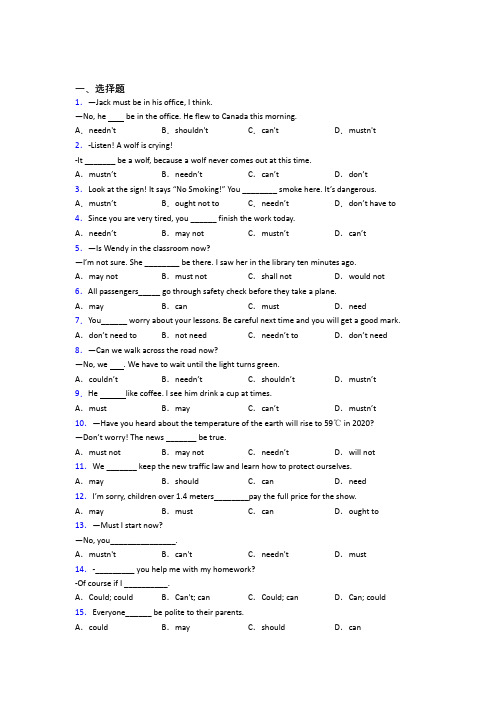
A.Yes, I couldB.No, I can’tC.Yes, I canD.No, I won’t
22.One ______ easily lose his way when he visits or comes to a new place.
A.mayB.mustC.needD.should
14.C
解析:C
【解析】
句意:你能帮助我做作业吗?——当然可以,如果我能的话。Could you……?表示委婉的请求,不表过去;表示能够,用情态动词can。故选C。
15.C
解析:C
【解析】
句意:每个人都应该对父母有礼貌。A. could可能;B. may也许;C. should应该;表示按理应当;D. can能够。根据句意故选C。
2.C
解析:C
【解析】
【详解】
句意:--听!狼在叫! --它不可能是狼,因为狼从来不会在这个时候出来。
A. mustn’t禁止;B. needn’t没有必要;C. can’t不可能;D. don’t构成一般现在时的否定句。根据“because a wolf never comes out at this time因为狼从来不会在这个时候出来”,可推断它不可能是狼,故选C。
A.Could; couldB.Can't; canC.Could; canD.Can; could
15.Everyone______ be polite to their parents.
A.couldB.mayC.shouldD.can
16.一Hurry up, Mark! Let's cross the road as quickly as possible.
期末语法复习五:情态动词、祈使句(知识点+习题) 22-23外研版八年级英语上册

electronic bikes.
A. Keep
В.To keep
C. Keeping
D. Kept
12.---Must I stay here with you, Mum?
---No, you ______ You may go home now, but you ______ go to the Internet
Cafe.
A. mustn't; needn't
B. needn't; mustn't C. must; need D. need; must
13. It's rather windy today. Put on some warm clothes, ________ you'll catch a
В. needn't
C. mustn't
D.can’t
3.-_______the endangered animals from now on, or they will die out one day.
-Yes, you are right.
A. Protecting B. To protect
C. Protect
【例】 Stop! 停下来! Cut up these bananas.把这些香蕉切碎。
(2)Be型:Be+表语(+其他)! 【例】Be a good boy!做一个好孩子!
(3)Let型:Let+宾语+动词原形(+其他). 【例】Letmehelpyou.让我来帮你。
(4)No+ v.-ing 形式/名词! 【例】 No smoking!禁止吸烟! No photos!不准拍照!
初中英语常用语法知识——情态动词知识点复习(含答案解析)
一、选择题1.Let’s ____________ volleyball. That _________ good.A.playing, is B.playing, sounds C.play, sounds D.play, is sound C解析:C【解析】【详解】句意: 让我们打排球吧,听起来不错。
play玩;sound听起来。
根据“Let's”可知这里let's do sth表示让我们做某事,后面跟动词原形,good是一个形容词,前面用系动词,句子叙述一件事实,时态用一般现在时,主语是单数,用第三人称单数形式,故选C。
2.______ talk in the library.A.Don’t B.Not C.Not to A解析:A【解析】【详解】句意:在图书馆不要说话。
此处是祈使句的否定形式,因此在动词原形前加don’t,故为Don’t+动词原形。
故选A。
3.The teacher often says, “ _____ late for school. ”A.Don’t B.Don’t be C.Not D.Doesn’t B解析:B【解析】【详解】句意:老师经常说:“上学不要迟到。
”老师的话是一个祈使句,祈使句的主要动词要用原形,late是形容词,前要加be动词。
祈使句的否定,是在句首加don’t。
故选B。
4.---Be careful, don’t forget to follow your father.---I know that, Mum. One can never be too careful.A.and B.or C.but D.so A解析:A【解析】试题分析:and和,并且;or或者,否则;but但是;so因此。
句意:小心,并且不要忘了跟着你的父亲。
——我知道,妈妈。
一个人不可能永远太过小心。
故选A。
考点:连词辨析点评:连词在句子中主要起联系上下文的作用,他们之间的区别就是表示逻辑关系的不同,所以在解题时先要理解上下文含义,然后根据上下文逻辑关系选择合适的连词。
情态动词全部知识点总结
情态动词全部知识点总结一、情态动词的基本概念及用法1. 情态动词的定义和特点情态动词是一种特殊的助动词,用来表示说话人对某种情态或可能性的态度。
情态动词具有一定的情态意义,表示说话人的态度、愿望、命令、建议、可能性等。
2. 情态动词的基本特点(1)情态动词没有人称和数的变化,即其形式不受主语的变化而变化;(2)情态动词后面通常接动词原形,构成情态动词的基本结构;(3)情态动词后面一般不加不定式的to,除了ought to外,其他情态动词后面不接to形式的动词。
二、情态动词的用法1. 表示能力、许可和请求(1)can和coulda. 表示能力,用于表达某人有能力做某事;例如:She can speak Chinese.(她会说中文。
)b. 表示请求,用于表示请求或允许;例如:Can I borrow your pen?(我能借你的笔吗?)(2)may和mighta. 表示许可,用于请求许可或征求对方的意见;例如:May I come in?(我可以进来吗?)b. 表示可能性,用于表示可能的情况;例如:It may rain tomorrow.(明天可能会下雨。
)2. 表示建议、命令和义务(1)shoulda. 表示建议,用于给出建议或提出主张;例如:You should see a doctor.(你应该去看医生。
)b. 表示义务,用于表示责任或义务;例如:We should obey the law.(我们应该遵守法律。
)(2)ought toa. 表示责任或义务,用于表示应该做的事情;例如:You ought to apologize to her.(你应该向她道歉。
)3. 表示可能性和必然性(1)musta. 表示必然性,用于表示肯定的推断或必然的结论;例如:He must be at home now.(他现在一定在家。
)b. 表示义务,用于表示应遵守的规定或责任;例如:Students must wear school uniforms.(学生必须穿校服。
苏州市初中英语语法知识—情态动词的知识点总复习有答案解析
一、选择题1.—Jack must be in his office, I think.—No, he be in the office. He flew to Canada this morning.A.needn't B.shouldn't C.can't D.mustn't 2.I hope you __________ to my birthday party.A.to come B.can come C.comes D.are come 3.I’ve bought a nice necklace for Jo’s birthday. She _____like it, but I’m not sure. A.can B.may be C.might D.must 4.—Is Wendy in the classroom now?—I’m not sure. She ________ be there. I saw her in the library ten minutes ago. A.may not B.must not C.shall not D.would not 5.—Is that Kate’s green bike?—It ____________be hers. She likes pink.A.can’t B.could C.mustn’t D.might 6.All passengers_____ go through safety check before they take a plane.A.may B.can C.must D.need 7.— Mom, I got a big box from express(快递). What is it?—I’m not sure. It ________be a present from your grandmother.A.should B.might C.must D.will8.I see the blackboard. I need to have my glasses.A.can B.can’t C.must D.mustn’t 9.—The book report is very important. You ________ write it carefully.—But I ________ hand it in now.A.must; must B.have to; mustC.must; have to D.have to; have to10.—Must I finish my homework this evening?—No,you ________.You have a three﹣day holiday.A.won't B.mustn't C.needn't 11.— May I have some wine?— No, you . You have to drive home later.A.shouldn't B.needn't C.mustn't D.may not 12.—Could I call you by the first name?—Yes, you .A.will B.could C.may D.might 13.-_________ you help me with my homework?-Of course if I __________.A.Could; could B.Can't; can C.Could; can D.Can; could 14.When I write down what I am showing thanks to, it’s always for things that moneyA.needn’t B.shouldn’t C.may not D.can’t15.–Is Mike coming to the fashion show tomorrow?--I’m not sure. He ______ not co me.A.must B.can C.may D.should16.Will you please________them________the Birdwatching Society?A.inviting; join B.to invite; to join C.invite; to join D.to invite; join 17.(2017 • 湖北省宜昌市中考)—Life is becoming convenient with the Internet.—That’s true! Almo st everything be done online.A.must B.would C.should D.can 18.—Must I sleep now? —No, you________.A.needn't B.mustn't C.can't D.may not19.一Already five people in the taxi, but the driver managed to take me as well.一Terrible, and it be an uncomfortable journey.A.can B.should C.must D.need20.—Who is the lady over there? Is it Miss Wang?—It __________be her. Miss Wang is much taller.A.needn't B.mustn't C.shouldn't D.can't21.---You look very pretty, if I say so.---Thanks a lot for saying that.A.must B.may C.will D.have to22.It is 11:00 p.m now. Peter hasn't come back yet. His mother ______ be very mad at him. A.may B.can C.must D.need【参考答案】***试卷处理标记,请不要删除一、选择题1.C解析:C【解析】【分析】【详解】句意:——我想杰克一定在他的办公室里。
2021年上海市中考英语语法复习:情态动词讲解及提升练习(有答案)
中考语法复习:情态动词讲解及提升练习一.定义:情态动词主要用于表示说话人的态度和看法。
情态动词不能单独使用必须与动词原形一起构成谓语,其否定式是在情态动词后加否定词not。
一般疑问句则将情态动词提至句首。
二、基本形式:三基本用法1. can 的用法1)表能力can表能力时意味着凭体力或脑力或技术等可以无甚阻力地去做某事。
I can climb this pole. 我能爬这根杆子。
He is only four , but he can read. 他只有4岁,但已认得字了。
Fire can’t destroy gold. 火烧不毁金子。
2)表可能性多用于否定与疑问结构中,但也可用在肯定句中。
Can the news be true? 这消息可能是真的吗?It can’t be true. 它不可能是真的。
What can he possibly mean? 他可能是什么意思?3)表示允许(和may意思相近)常见于口语。
Can (May) I come in ? 我能进来吗?Can I smoke here ? 我可以在这里抽烟吗?2.could的用法1)表过去的可能和许可,Father said I could swim in the river. 爸爸说我可以在河里游泳。
2)表过去的能力I could swim when I was only six. 我刚六岁就能游泳。
3)表“允许”。
可表示委婉客气的提出问题或陈述看法,不是can的过去时态。
---Could I use your bike? ---Yes, you can./No, you can’t.注意:be able to 表示能力,意为“能够做成某事”,相当于can 的用法,但是有区别:can泛指一般的能力;be able to 则主要指成功做了某件事的能力。
3. may(might)的用法1)表示请求、可以、允许。
You may drive the tractor. 你可以开那台拖拉机。
- 1、下载文档前请自行甄别文档内容的完整性,平台不提供额外的编辑、内容补充、找答案等附加服务。
- 2、"仅部分预览"的文档,不可在线预览部分如存在完整性等问题,可反馈申请退款(可完整预览的文档不适用该条件!)。
- 3、如文档侵犯您的权益,请联系客服反馈,我们会尽快为您处理(人工客服工作时间:9:00-18:30)。
一、选择题1.—______ you please tell me something about the life in Canada or America?—Sorry, I______. I don’t know either. I’m from Australia.A.Could; couldn’t B.Can; couldn’t C.Could; can’t D.Can; mustn’t 2.Since you are very tired, you ______ finish the work today.A.needn’t B.may not C.mustn’t D.can’t3.—Is Wendy in the classroom now?—I’m not sure. She ________ be there. I saw her in the library ten minutes ago.A.may not B.must not C.shall not D.would not 4.The designer has tried every possible way to make the robot light, so you _____ worry about its weight.A.must B.may C.can’t D.needn’t5.All passengers_____ go through safety check before they take a plane.A.may B.can C.must D.need6.A: Is Jim coming by train?B: I’m not sure. He _______ drive his car.A.must B.may C.need D.should 7.—Jenny, you _________ push your way onto the bus.—I’m really sorry about it.A.mustn’t B.needn’t C.may not8.From March 23rd, 2013, anyone under the age of 14 ________ go into Disneyland alone. A.couldn’t B.mustn’t C.needn’t D.mightn’t 9.—Can I take some milk and biscuits to the reading room?—No, our school has a rule that students _______ eat or drink there.A.can’t B.mustn’t C.needn’t D.may not 10.— I wonder if these are Jim's glasses.—They _____his. He doesn't wear glasses.A.might be B.could be C.can't be11.—How nice the building is! What is it for? —It ________ a hotel. But I’m not sure. A.must be B.have to be C.may be D.can be12.—________ David be the new chairperson of the Students’ Union?—He _______ be, but I’m not sure.A.Can; can’t B.Can; mayC.May; must D.May; mustn’t13.—Sorry, Ms Wang. I left my homework at home. Must I hand it in today?—No, you_______ . You_______ bring it here tomorrow.A.mustn’t; should B.needn’t; must C.mustn’t; may D.needn’t; c an 14.The milk tastes bad. You’d better_______.A.throw it away B.to throw it awayC.throw them away D.to throw them away15.Since the road is muddy,it ________last night, ________?A.must be rained; wasn’t it B.must have rained; didn’t itC.must rained; d idn’t it D.must have rained; wasn’t it16.This book _____ Lucy’s. Look! Her name is on the book cover.A.must be B.may be C.can’t be D.mustn’t be 17.The flowers ________ every day, or they will die.A.must water B.can be wateredC.should water D.must be watered18.-_________ you help me with my homework?-Of course if I __________.A.Could; could B.Can't; can C.Could; can D.Can; could 19.Everyone______ be polite to their parents.A.could B.may C.should D.can20.一Hurry up, Mark! Let's cross the road as quickly as possible.一No,you . Don't you see the light is still red?A.couldn't B.wouldn't C.mustn't D.needn't 21.—We've prepared all kinds of foods for the picnic.—Do you mean I___ bring anything?A.can't B.needn't C.mustn't D.won't 22.—Tom, we’re goin g shopping at eight, right?—Yeah, but I ______ be a little late, so don’t wait for me.A.may B.should C.mustn’t【参考答案】***试卷处理标记,请不要删除一、选择题1.C解析:C【解析】【详解】句意:——你能告诉我一些在加拿大或者在美国的生活吗?——抱歉,我不知道,我来自澳大利亚。
could可以是can的过去式,但是在位于句首表示请求对方做某事的时候,表示礼貌而非过去时态。
can表示能力,表示能够做某事。
在空格一中,表示礼貌请求对方做某事,用could表示委婉语气;空格二中can’t表示回答者做不到,因为回答者来自澳大利亚而非加拿大或者美国。
故选C。
2.A解析:A【解析】【详解】句意:既然你很累,今天就不必完成这项工作了。
A. needn’t不必;B. may not 可能不;C. mustn’t禁止;D. can’t不能。
根据上文Since you are very tired,可知,情态动词needn’t表示不需要,后面直接加动词原形。
根据题意,故选A。
3.A解析:A【解析】【详解】句意:—温迪现在在教室吗?—我不确定。
她可能不在那里,十分钟前我在图书馆见过她。
考查情态动词表推测。
may not可能不;must not一定不要;shall not将不会;would not将要、会、就会,表示虚拟、假设、条件等。
根据回答句“I’m not sure”,可推测后句应该是说:她可能不在那里。
是对现在情况的推测,may not“可能不”。
故选A。
4.D解析:D【解析】【分析】【详解】句意:设计者已经尝试了所有可能的方法使机器变轻,所以你不必担心它的重量。
must必须;一定;may可以;可能;can’t不能;不可能;needn’t不必,没有必要。
根据句意The designer has tried every possible way to make the robot light可知,设计者在努力使机器变轻,所以担心是没有必要的。
故应选D。
5.C解析:C【解析】【详解】句意:所有乘客在乘坐飞机前必须经过安全检查。
考查情态动词辨析。
may可以,表许可或请求;can能,表能力或许可;must必须,指一定;need需要,指有必要。
根据句意语境可知,安检强调“必须,一定”,故选C。
6.B解析:B【解析】【详解】句意:——吉姆坐火车来吗?——我不确定,他可能开自己的车。
考查情态动词辨析。
A项,必须,一定,表示肯定推测;B项,也许,表示有可能;C项,需要;D项,应该。
根据回答部分I’m not sure.可知,此处并不确定吉姆是开车来还是乘坐火车来,所以此处是“可能”。
故选B。
【点睛】must意为“必须,应该”,可以表示主观上一定要做什么或者肯定推测。
例如:I must go home to look after my mum. This pair of shoes must be hers. may意为“可以,也许”,可以表示请求或者推测(无法断定)。
例如:May I come in? It may be hers,but I’m not sure. need意为“需要”,既是情态动词也是行为动词。
例如:You needn’t finish your homework right now. You need to tell him the truth. should意为“应该”,表示责任或者义务。
例如:You should finish practising playing the piano at first.7.A解析:A【解析】【详解】句意:——Jenny,你一定不要挤上公共汽车。
——对此我真的很抱歉。
考查情态动词。
